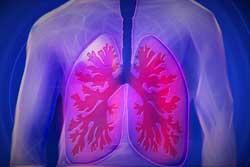Archives
Putting the Brakes on Lung Disease
 When an individual has emphysema, or chronic obstructive pulmonary disease (COPD), their lung tissues are destroyed by chronic inflammation, which is largely caused by specialized white blood cells known as neutrophils and macrophages. Although these cells can effectively combat lung infections, they can also attack the lung's elastic fibers leading to breathing difficulties and chest infections.
When an individual has emphysema, or chronic obstructive pulmonary disease (COPD), their lung tissues are destroyed by chronic inflammation, which is largely caused by specialized white blood cells known as neutrophils and macrophages. Although these cells can effectively combat lung infections, they can also attack the lung's elastic fibers leading to breathing difficulties and chest infections.
While a cure for COPD does not currently exist, a recent study published in The Journal of Clinical Investigation suggests that COPD and co-associated medical problems can be prevented by directly “blocking” the G-CSF protein that is known to commonly stimulate the production of white blood cells.
“We found elevated levels of G-CSF in mice with COPD, and when it was eliminated, the excessive numbers of white blood cells in their lungs were markedly reduced and the lungs themselves no longer became diseased,” said the senior author of the study, immunologist Associate Professor Margaret Hibbs.
Researchers discovered that by adjusting the dose of any eventual therapeutic, they may have the ability to maintain white blood cells' infection-fighting capabilities as well as prevent the damage that leads to COPD. The study could potentially provide the key for the first ever treatment that prevents the disease from progressing. It could also provide a new ‘biomarker’ to screen patients and identify COPD much earlier.
“When we blocked G-CSF, the effect was absolutely striking. It prevented not only the emphysema but also the wider medical problems, whether it be the heart, muscles or bone. We realized we had uncovered a potential pathway for treatments," said collaborator Professor Gary Anderson, director of the Lung Health Research Centre at the University of Melbourne. “We now have a very good case that we have indeed found a mechanism not just for preventing emphysema and chronic bronchitis in the lungs, but also for preventing the damaging medical conditions associated with it."
“This would be the first ever strategy that would not only treat the lung disease but the co-associated medical conditions at the same time. If successful, this has the potential to benefit the millions of people who suffer this terrible disease," said Hibbs.
Click Here to Access the Full Article on The University of Melbourne




